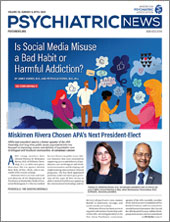FDA Warning Highlights Mefloquine’s Mental Health Risks
Abstract
An antimalarial drug with a long history of adverse psychiatric side effects gets a tougher warning label from the Food and Drug Administration.
The U.S. Food and Drug Administration (FDA) issued an updated boxed warning in late July about the psychiatric and neurologic side effects of the antimalarial drug mefloquine hydrochloride.
“The neurologic side effects can include dizziness, loss of balance, or ringing in the ears,” said the announcement from the agency’s Division of Drug Information. “The psychiatric side effects can include feeling anxious, mistrustful, depressed, or having hallucinations.”
The existing label already cautioned against prescribing mefloquine (formerly trade-named Lariam but no longer marketed under that name) to patients with a history of seizures or psychiatric disorders.
The drug was originally developed by scientists from the Walter Reed Army Institute of Research, but military use has declined in recent years, from 17,361 service members in 2008 to 889 in July, according to an August 12 memo from assistant secretary of defense for health affairs Jonathan Woodson, M.D., to the surgeons general of the U.S. Army, Navy, and Air Force.
“Mefloquine is the drug of last resort for malaria prophylaxis and should only be used in persons with contraindications to chloroquine, doxycycline, and atovaquone-proguanil,” wrote Woodson.
Adverse effects seem to be unpredictable for those without prior risk factors.
Travel medicine specialist Wesley Van Voorhis, M.D., Ph.D., has experienced mefloquine from both sides—treating patients returning from malarial regions and taking the drug himself.
“I had weird dreams but no psychotic effects,” he told Psychiatric News. His patients, though, have run the gamut, from having no effects at all to those weird dreams to fearfulness to frank paranoia.
“I’ve prescribed the drug a number of times, and problems have happened only rarely,” said Van Voorhis, a professor of medicine and head of the Allergy and Infectious Diseases Division at the University of Washington in Seattle.
The labeling change was primarily motivated by “the possibility of persistent vestibular adverse effects after drug use is discontinued and the possibility of permanent vestibular damage,” Stephanie Yao of the FDA’s Office of Media Affairs told Psychiatric News.
The FDA warns patients to “contact your health professional right away” if they experience dizziness, vertigo, tinnitus, seizures, or insomnia.
“In our Drug Safety Communication, we noted that patients who experienced vestibular symptoms usually had concomitant psychiatric symptoms such as anxiety, confusion, paranoia, and depression,” said Yao. “In our decision to add a boxed warning about the vestibular neurologic adverse effects, it made sense to also highlight the existing warning about psychiatric adverse effects.”
However, the advice to contact one’s health professional suggests an implicit contradiction to preventive medicine specialist Remington Nevin, M.D., M.P.H.

Expecting patients suffering from mefloquine toxicity to report their impairment to their doctors is like asking a person who’s had too many drinks to decide whether or not to drive, said Remington Nevin, M.D., M.P.H.
“That’s like asking a person who’s had too many drinks to decide whether or not to drive,” said Nevin, a former U.S. Army physician and now a doctoral candidate in the Department of Mental Health at the Johns Hopkins Bloomberg School of Public Health, in an interview. “It is unreasonable to expect someone with symptoms of paranoia, psychosis, or mania to contact a doctor and act appropriately in such a case.”
A more reasonable risk-mitigation strategy would be for the FDA to mandate a test prescription of one or two doses of mefloquine before the patient travels to a malarial region, said Nevin, who has studied the drug’s effects for more than five years. Medication for the full travel period would be prescribed only after evaluation for neurological or psychiatric reactions.
The more-expensive combination of atovaquone and proguanil (brand name Malarone) is an alternative.
Both Van Voorhis and Nevin noted that whatever causes mefloquine’s effects on the brain remains a mystery.
“One hypothesis is that since the drug is a potent inhibitor of intercellular electrical communication, it blocks gap junction channels, especially in inhibitory neurons in the limbic system,” said Nevin. “That in turn has downstream effects on dopaminergic tone, with observable behavioral correlates.”
Also, while many people who have mild symptoms do not progress to psychosis, those who experience the most serious symptoms appear at greatest risk for chronic symptoms, suggesting potentially direct neurotoxic effects of the drug, he said.
The long-lasting nature of symptoms for some may happen because the drug concentrates in the brain and is eluted slowly, said Van Voorhis. “That may be good for protection against malaria but bad neuropsychiatrically.”
However, any explanation is highly speculative at this point, they emphasized.
Nevin raised another point about mefloquine, drawing on his Army experience.
Since the chronic psychiatric side effects can last for years and can include panic, memory problems, and lack of concentration, they could be confused with symptoms of posttraumatic stress disorder (PTSD) or traumatic brain injury (TBI), he noted.
“So maybe many veterans diagnosed with PTSD or TBI may really be suffering from the chronic effects of mefloquine toxicity,” he said, backing the change in prescribing priorities. “Mefloquine is an exposure we can safely eliminate to reduce the burden of illness in the military.” ■
The FDA announcement about mefloquine is posted at http://www.fda.gov/Drugs/DrugSafety/ucm362227.htm. An abstract of “Psychiatric Side Effects of Mefloquine: Applications to Forensic Psychiatry” by Elspeth Cameron Ritchie, M.D., M.P.H.; Jerald Block, M.D.; and Remington Nevin, M.D., M.P.H., is posted at http://www.jaapl.org/content/41/2/224.abstract.



